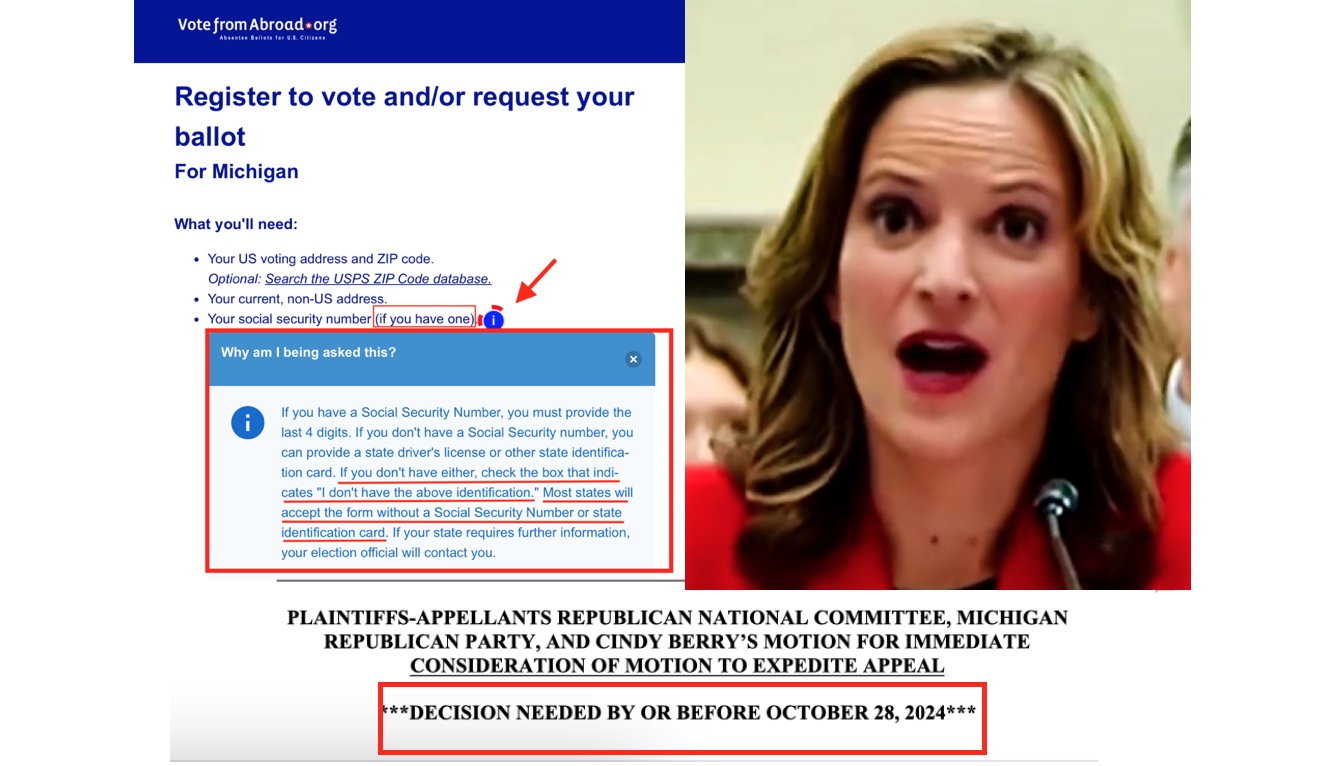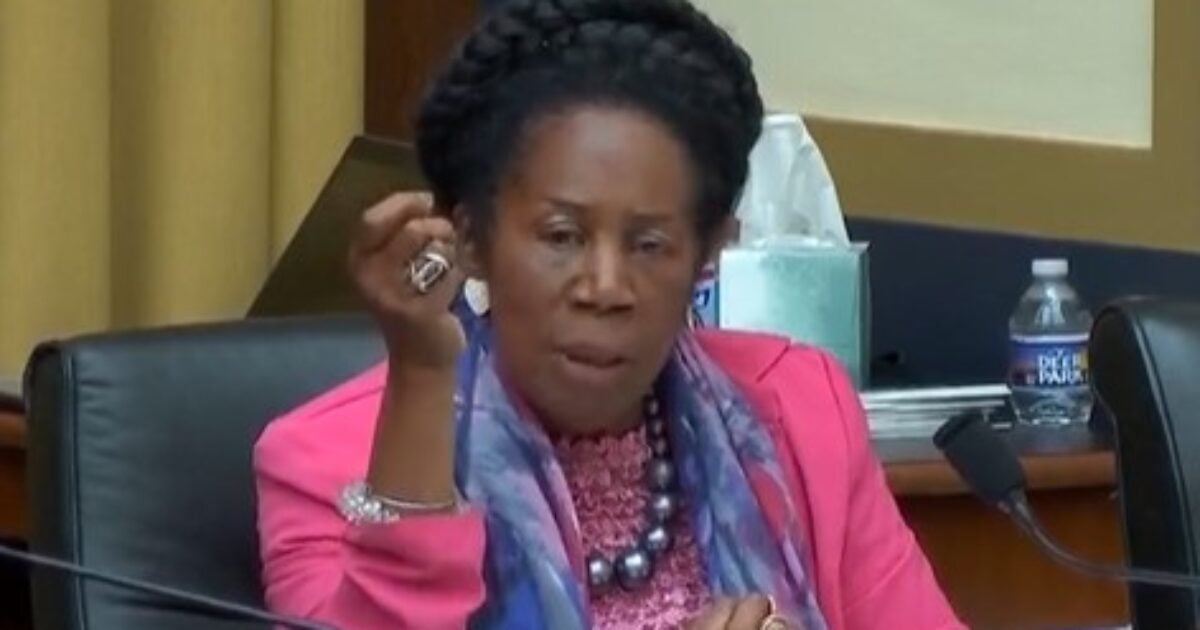On October 9, the MIGOP and RNC filed a lawsuit against MI SOS Jocelyn Benson and Jonathan Brater, Director of the MI Bureau of Elections.

Although Jocelyn Benson has already lost ten lawsuits to date, she continues to mock those who attempt to force her to follow the law and immediately secure Michigan’s elections.
Shouldn’t a state’s top election official make it his or her responsibility to ensure that every election official implements basic requirements like voter identification, verification of US citizenship, and signature and address verification? Don’t Michigan voters deserve the right to feel comfortable knowing that dead voters are still listed as active voters on the voter rolls, outside, third-party groups are not attempting to register dogs, US Postal workers aren’t dropping off stacks of ballots in drop boxes in strict violation of the USPS rules, there are not more registered voters than eligible voters in 53 counties in the state of MI, election officials or workers are not manipulating voter rolls, and that eligible voters are allowed to vote ONCE in our elections?
Why would any Secretary of State fight to stop those safeguards from being implemented?
On October 21, a Democrat Judge Sima Patel, a Democrat Governor Whitmer appointee, dismissed the MIGOP and RNC lawsuit against MI SOS Jocelyn Benson and the MI Director of Elections, Jonathan Brater. The lawsuit simply asked for the two top election officials to follow the MI Constitution and verify that ONLY Michigan residents can vote in our elections from overseas:
The Michigan Constitution allows Michigan residents—and only Michigan residents—to vote. See Const. 1963, art. 2, § 1 (“Every citizen of the United States who has attained the age of 21 years, who has resided in this state six months, and who meets the requirements of local residence provided by law, shall be an elector and qualified to vote in any election except as otherwise provided in this constitution. The legislature shall define residence for voting purposes.”)
The Michigan judge said the lawsuit was an attempt to “disenfranchise” voters.
Curiously, the judge never mentioned the millions of MI voters, including those serving in our US military, whose votes are at risk of being canceled out by an unchecked system of voting only available to overseas, non-military voters, who potentially have the ability to change the outcome of the elections in Michigan.
MI SOS Jocelyn Benson took to “X” to boast about the judge’s decision while, at the same time, misleading Michigan voters into believing the lawsuit had anything to do with “military voters” in a post on “X.”
She wrote: “A win for voters and democracy today in Michigan!” adding, “A federal court upheld our work to ensure military service members and their families serving overseas can vote, rejecting the RNC lawsuit as an “11th hour attempt to disenfranchise these electors.”
I responded to her dishonest propaganda tweet with a chart showing the large disparity in numbers between overseas non-military compared to military members and their families.
MOST of the UOCAVA voters are not US military or family members.
The lawsuit was not aimed at US military members, as they DEFINITELY provide ID & are legitimate residents of the state where they vote.
You are not telling the truth Jocelyn Michelle Benson. pic.twitter.com/f2RwU6Unjk
— PattyMI (@PattyLovesTruth) October 22, 2024
This morning, the MI GOP and RNC appealed the decision of the MI Court of Claims.
The appeal to the MI Court of Appeals filed by the MI GOP and RNC requests a decision no later than October 28, 2024, and states
The plaintiffs’ complaint is not directed at MCL 168.759a. Rather, plaintiffs take issue with language in the Secretary of State Election Officials Manual permitting the subject group to register and vote in Michigan, even if they never personally resided in Michigan: Eligibility to register to vote using the FPCA [federal postcard application] or FWAB [federal write-in absentee ballot]
To be eligible to register to vote using the FPCA or the FWAB, the voter must be absent from their jurisdiction of residence. If the voter is a civilian, the voter must be living outside of the United States and its territories. If the voter is a member of a uniformed service on active duty, a member of the Merchant Marine, or a National Guardsman activated on state orders, or if the voter is a dependent of a member of any of the listed organizations, the voter is eligible to register to vote using the FPCA or FWAB regardless of whether the voter is serving overseas or inside the United States. Each UOCAVA voter must submit their own FPCA or FWAB form.
A United States citizen who has never resided in the United States but who has a parent, legal guardian, or spouse who was last domiciled in Michigan is eligible to vote in Michigan as long as the citizen has not registered or voted in another state.
Registration address for UOCAVA voters
A UOCAVA voter may register to vote at their last address of residence in the jurisdiction in which they are registering even if someone else now resides at that address, if the building where the voter resided has been demolished, or if the address no longer exists. The only requirement is that the address supplied by the voter is the last address which the voter considered their permanent residence within the jurisdiction in question. [Secretary of State Election Officials Manual, Chapter 7: Military and Overseas Votes (July 2024), p 3 (emphasis added).]
Plaintiffs filed suit complaining that this section of the Manual violates Const 1963, art 2, § 1, which provides:
Qualifications of electors; residence.
Every citizen of the United States who has attained the age of 21 years,[1] who has resided in this state six months, and who meets the requirements of local residence provided by law, shall be an elector and qualified to vote in any election except as otherwise provided in this constitution. The legislature shall define residence for voting purposes.
Plaintiffs seek a declaratory judgment that Const 1963, art 2, § 1 requires every voter to have resided in Michigan for a six-month period, and the federal UOCAVA preempts this state residency requirement only to the extent the absent uniformed services or overseas voter (or their spouse or dependent) each personally last resided in Michigan.
As such, plaintiffs seek a declaration that the Manual’s provision that a spouse or dependent is eligible to vote despite never living in the United States or Michigan is invalid.
Despite the misinformation being pedaled by Michigan’s top election official, the appeal clearly states:
Plaintiffs do not challenge the constitutionality of any Michigan statute, however.













